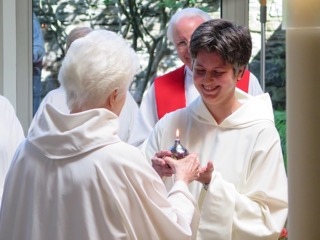"I've been to the mountaintop..."A young Carmelite shares her vocation story to the contemplative life
Sr. Cecilia Ashton, OCD
Monday, November 7, 2016
“Seized by the unconditional love of Jesus, the Christ, and allured to the mountaintop, we embrace the mystical flame of contemplation as our life’s grounding. The silence and solitude of our life of prayer immerse us in a deep communion with God that draws us into a full and willing participation in the unfolding of a new and transformed consciousness. Such radical openness to the power and meaning of this union of love calls from us nothing less than everything and propels us toward total communion with one another, with all people and species, and with the entire creation. This is the vision that we desire to live for the life of the Church and on-going emergence of humanity and our planet earth” (Carmelite Sisters of Baltimore Vision Statement).The contemplative asks this question: What is my experience of God and how do I allow that experience to inform my life? I was born and raised Catholic, went to Catholic school from kindergarten through college, and participated in the life of the Church, but I never realized that there was a deep mystical tradition within the Catholic Church. While I said my prayers and participated, on and off, in the sacraments, there is a way in which I kept God on the periphery. It was as if “my life” and “my life with God” were separate. My compartmentalization of God and my desire to help others caused me to focus my time and effort on my career, taking me from college into dental school, and subsequently into a very successful career as a dentist. At the age of 30, I owned two dental practices and in many respects I thought my life was set. And while I was very happy with the life I was living, I felt the desire for something more. As I allowed the light of Christ to infiltrate my life, I began to realize that while I had a wonderful career, it wasn’t a vocation. Vocation answers the question, who am I, not what do I do? And not just who am I, but specifically who am I in the light of Christ?
 The more I prayed, the more this desire intensified and the more restless I became until finally I took a huge leap of faith. I sold my house and my practices to enter the Carmelite Monastery in Baltimore. It took me 6 years from the time I first came to the monastery until I was able to enter. When you turn your life completely over to God and allow your life to be seized by Christ, you will be led to places you can’t even imagine!
For me, being a Carmelite nun means being occupied with Christ – setting my eyes on Him; praising God in all I do; meditating on the law of the Lord day and night; living a life that reveals a generous and merciful God; and offering to others the peace, hope, and unconditional love of Christ. From what I have come to understand, it is transformation that lies at the heart of the contemplative life; informing and transforming my heart, my desire, and myself. This flame of love I desire both wounds and heals, it strengthens and burdens, molds and shapes. It is a continual giving over of myself in faith and love.
Through prayer I am drawn into both an experience of the profound pain and suffering that is part of our collective consciousness, as well as the deep and abiding love of Christ that guides us toward unimaginable horizons of unity and connectedness with God and one another. It is my deep belief that the fruit of my relationship with Christ, the transformation of my own life, and the peaceful living out of my life in community will indeed transform our world and aid in bringing forth the reign of God.
The more I prayed, the more this desire intensified and the more restless I became until finally I took a huge leap of faith. I sold my house and my practices to enter the Carmelite Monastery in Baltimore. It took me 6 years from the time I first came to the monastery until I was able to enter. When you turn your life completely over to God and allow your life to be seized by Christ, you will be led to places you can’t even imagine!
For me, being a Carmelite nun means being occupied with Christ – setting my eyes on Him; praising God in all I do; meditating on the law of the Lord day and night; living a life that reveals a generous and merciful God; and offering to others the peace, hope, and unconditional love of Christ. From what I have come to understand, it is transformation that lies at the heart of the contemplative life; informing and transforming my heart, my desire, and myself. This flame of love I desire both wounds and heals, it strengthens and burdens, molds and shapes. It is a continual giving over of myself in faith and love.
Through prayer I am drawn into both an experience of the profound pain and suffering that is part of our collective consciousness, as well as the deep and abiding love of Christ that guides us toward unimaginable horizons of unity and connectedness with God and one another. It is my deep belief that the fruit of my relationship with Christ, the transformation of my own life, and the peaceful living out of my life in community will indeed transform our world and aid in bringing forth the reign of God.
 As I prepared for 1st Profession in May of 2016, I came face to face with the elephant in the room – what if no one else comes? After much prayer and reflection, I was convinced that it didn’t matter. While I hope that God will continue to call others to embrace the Carmelite life of prayer and specifically to join this particular community, I realized that my vocation isn’t dependent on the next person who may or may not enter after me. In the depth of my being I know that God has called me to this monastery and I believe that the Carmelite life is as relevant today as it was in the time of St. Teresa of Avila.
My journey thus far has required much sacrifice, trust, hard work, and determination. While I have no idea what the vows will ask of me over a lifetime, I know that I am imperfect and I will grow and mature in ways that I cannot predict, I will struggle with things I cannot envision, and the meaning of the vows will change as I live into them. I arrive at this moment bringing the totality of my past and I stand here offering my present and future unconditionally to God and this Carmelite community.
As I prepared for 1st Profession in May of 2016, I came face to face with the elephant in the room – what if no one else comes? After much prayer and reflection, I was convinced that it didn’t matter. While I hope that God will continue to call others to embrace the Carmelite life of prayer and specifically to join this particular community, I realized that my vocation isn’t dependent on the next person who may or may not enter after me. In the depth of my being I know that God has called me to this monastery and I believe that the Carmelite life is as relevant today as it was in the time of St. Teresa of Avila.
My journey thus far has required much sacrifice, trust, hard work, and determination. While I have no idea what the vows will ask of me over a lifetime, I know that I am imperfect and I will grow and mature in ways that I cannot predict, I will struggle with things I cannot envision, and the meaning of the vows will change as I live into them. I arrive at this moment bringing the totality of my past and I stand here offering my present and future unconditionally to God and this Carmelite community.Related Articles:
Category: Featured, General Posts, Pope Francis, Special Events
Tag: Easter, Good Shepherd Sunday, Pope Francis, vocations
Pray with the Pope Reflection – June 2025
Friday, June 13, 2025
 Fr. Edmund Lo, SJ
Fr. Edmund Lo, SJ
In this month of June, the Holy Father invites us to pray that the world might grow in compassion, that each one of us might find consolation in a personal relationship with Jesus, and from his Heart, learn to have compassion on the world.
Chaplaincy: “Divine Coffee” for Students
Tuesday, June 10, 2025
 Gianpaolo Capozzi
Gianpaolo Capozzi
Gianpaolo gives us a behind the scenes look at his upcoming Behold segment on the York University Catholic Chaplaincy.
Pope Leo XIV’s homily for Pentecost Sunday 2025
Sunday, June 8, 2025
 Pope Leo XIV
Pope Leo XIV
On Sunday, June 8, 2025, Pope Leo XIV celebrated Mass for the Jubilee of Movements, Associations, and New Communities and spoke about how the Holy Spirit helps the apostles overcome "their fear, shatters their inner chains, heals their wounds, anoints them with strength and grants them the courage to go out to all and to proclaim God’s mighty works."
Homily of Pope Leo XIV at the Mass for the Jubilee of Families, Children, Grandparents, and the Elderly
Sunday, June 1, 2025
 Pope Leo XIV
Pope Leo XIV
Pope Leo XIV celebrated Mass for the Jubilee of Families, Children, Grandparents, and the Elderly and referred to Pope Francis and mentioned spouses who have been beatified and canonized, like the parents of St. Therese of the Child Jesus.
Looking back on Rerum Novarum
Monday, May 26, 2025
 Matthew Neugebauer
Matthew Neugebauer
Pope Leo XIV chose his name primarily to highlight his most recent namesake Leo XIII, whose "historic encyclical Rerum Novarum addressed the social question" to the challenges of his time. What concerns does the encyclical address? How does it speak to its time? And what has been its legacy 134 years later?
SUPPORT LABEL
$50
$100
$150
$250
OTHER AMOUNT
DONATE













